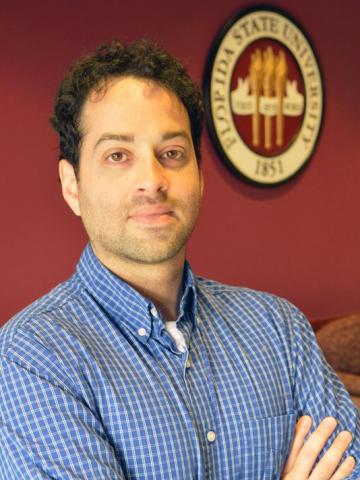Social Work Faculty Member Promoted to Full Professor

Dr. Yaacov Petscher, an FSU College of Social Work faculty member, was promoted this year to full professor. He reached this academic achievement through a unique and personal scholastic journey, one directed by his guiding principles – intellectual curiosity and humility. His varied roles with the Florida Center for Reading Research (FCRR), including the center director of the Quantitative Methodology and Innovation division and deputy director of the National Comprehensive Center to Improve Literacy for Students with Disabilities, illustrate his non-traditional academic journey.
He is also a four-time Florida State University graduate with a doctoral degree in developmental psychology (2009), master’s degrees in measurement and statistics (2005) as well as educational psychology (2004), and his bachelor’s degree in psychology (2001). Petscher was drawn primarily to the lab setting and has been dedicated first and foremost to science.
As he reflected on his recent promotion to full professor, he remarked on the place of enormous privilege professors have to push forward “translational research,” research that finds a practical application and advances the traditional scholarly articles and academic presentations. “The opportunity that full professor provides is an opportunity to widen the lens of interest and applicability for research,” Petscher observed. “I can now take more scientific risks spending my time in fostering international collaborations to support other scientists, and I can invest my time to create tools or products that are evidence-based and empirically supported.”
Petscher is not new to innovation, utilizing his unquenchable intellectual curiosity to publish books on a range of topics, including statistics, reading research and soon a graphic novel based on “The Uncanny Chronicles,” a comic series addressing reading challenges. But Petscher and his colleagues at FCRR set their sights also on accessibility. “Science should be used, in part, to both understand and break down barriers to create greater educational equity,” he explained. “I’m fundamentally interested in human flourishing. By localizing innovations through reading research, we can help vulnerable or disadvantaged populations improve reading development because reading is a gate key to success worldwide.”
A recent project in this vein is the Reach Every Reader Project, funded by the Chan Zuckerberg Initiative and featuring a collaboration of researchers from FCRR, Massachusetts Institute of Technology (MIT) and Harvard University. The interdisciplinary project aims to change the way people think about assessing reading and supporting struggling readers. This work entails seeing reading within a systems context, including the experiences of a child, the contexts of the classroom and home, and the tools and assessment systems being used. Petscher noted that part of the project’s objective is to create and test mechanisms that may remove prejudice when assessing a child for a reading or language disorders by using and training speech recognition algorithms sensitive to language variations like dual-language learning and dialect variations.
Another related project that further considers language variations is the ReadNet Project, funded by the Schmidt Foundation and Citadel, and another collaboration for FCRR and MIT. The project is developing speech recognition technology and algorithms that can identify children at risk of developing reading difficulties.
But Petscher’s projects don’t always concentrate on creating something new. The FCRR originally developed hundreds of free paper-pencil Student Center Activities (SCA) in the early 2000s for teachers to use in the classroom to encourage early literacy development in children from PreK through 5th grade. During the COVID-19 pandemic, he and colleagues at FSU, Harvard University, and the University of Toronto received funding from the Jacob’s Foundation to reinterpret those activities for parents and caregivers who suddenly found themselves faced with leading home-based learning for their children.
The needs of these parents, caregivers and teachers were raised by UNESCO. Petscher and his FSU colleagues Lakeisha Johnson (College of Communication and Information), Beth Phillips (College of Education), and Christopher Lonigan (Department of Psychology), along with Nadine Gaab (Harvard University) and Kaja Jasinska (University of Toronto), set about answering these challenges. The project reinterprets existing teacher-student games for early literacy to paper and digital formats for at-home learning. These adapted materials aid in building parent/caregiver self-confidence and self-efficacy and their children’s success. The team worked with local and international patterns in Panama, India, and Ivory Coast, among others, to better adapt the materials to different localized and global contexts and languages.
Petscher’s unique background and research interests are working to bridge connections between reading research and social work by looking at the role of parental trauma on children’s reading and language development. “As a quantitative methodologist, my work has always been about bridging the world of research design and data analysis with reading theory for scientific work. I want to help do the same to promote more interdisciplinary work in reading and social work research,” he expounded. Recalling that one of his favorite classes during his graduate work was a course on measurement he took with social work Professor Dr. Neil Abell, he created his own assessment measure on adolescent grief and published on it. “That class taught me a lot about how to teach,” he expanded. “That’s actually how I teach my classes. I want students to have a real-life outcome they can do something with.”
It’s these types of influences that he also credits as helping to sustain his research interests. “It is about pursuing your passions with the input of trusted individuals, finding people who have maybe walked a path you are thinking of pursuing but have not just accepted the status quo,” Petscher recalled. “Be relentlessly curious. Sometimes you will be boldly incorrect. Be okay with failing. The more you can model vulnerability, the more we understand that is part of science and research.”
He and colleagues at the FSU College of Social Work, with other collaborators, are continually bridging the gaps between disciplines for the vital purpose of improving the outcome for the vulnerable populations they serve.

